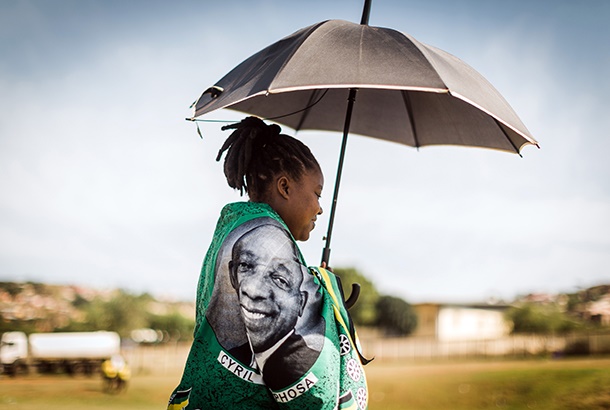
President Cyril Ramaphosa faces an extended battle with the rogue elements in the ANC. Mpumelelo Mkhabela says the this battle will define both the nature of the party and Ramaphosa's character as a leader.
The ANC has a reputation as a "broad church" in which coexist nationalists, liberals, workers, the propertied class, the unemployed and communists. This spirit of tolerance made it a church of contradictions, best illustrated by the ideological fights within the tripartite alliance. For ideological purists, this was untenable.
The unity of the diverse groupings against the common enemy of apartheid was the ANC's strength. If managed and nurtured properly, this diversity, with all its contradictions, could continue to serve as a strength for the party in government. It cannot be a weakness for all strands of society to see themselves reflected in the governing party.
Since it took over power, however, the ANC has added groups that are threatening the very existence of the church. According to former ANC secretary general Kgalema Motlanthe, the party, like the former Communist Party of the Soviet Union, has attracted its share of filth in the form of rogues, boastful, noisy elements and careerists.
The ANC's rogue elements that presided over state capture have gained notoriety and attracted attention. Gangster State, the book about ANC secretary general Ace Magashule's ruinous years in the Free State government, in many ways suggests Motlanthe's observations could be worryingly true.
Even more dramatic for a book of that title is the gangster manner in which a public discussion about it, that is the book launch event, was disrupted at Exclusive Books in Sandton by people claiming to be members of the ANC defending their secretary general. Other members of the party had publicly announced plans to burn copies of the book in Free State, Magashule's home province. Thankfully, sanity prevailed as the ANC intervened to stop such barbaric actions from taking place.
But it's not the whole ANC that prevailed. It is the sensible component of the ANC which is waging a battle against the rogues. The rogues have so far lost three times on the Gangster State matter alone. First, they were told not use the name of the ANC to defend allegations against an individual. Secondly, their gangster conduct in Sandton was condemned. The ANC aligned itself with public sentiment of disgust against the thuggery. Lastly, they were stopped in their tracks from burning books in the Free State.
The battle is not over. The rogues, like all ordinary members of the party, feel entitled to do what they like to defend Magashule, for whom they apparently have a lot of respect.
In the run-up to Polokwane, ANC T-shirts bearing President Thabo Mbeki's name were burnt by people claiming to be supporters of Jacob Zuma. One suspects that, even though rogues had already infiltrated the party, they became daring for the first time when they publicly burnt the Mbeki T-shirts in KwaZulu-Natal.
If you could burn paraphernalia bearing colours of your own party, surely a book by a critical journalist should be easy meat. It's obviously not the same crowd and the context is different. Those responsible, however, have one thing in common: they are rogues who support leaders based on narrow considerations, and are prepared to sacrifice what were once noble party principles to get what they want.
The battle against the Sandton disrupters should not be seen in isolation. Indeed, it would have been naïve not to read the political significance of the burning of the Mbeki shirt. The significance was confirmed in Polokwane.
The battle is ongoing. Many people, including ANC veterans, are involved in this battle as they try to shield the ANC from the rogues. No one knows where it will all end.
As it intensifies, it will be fought on three fronts. First, inside the party among those who believe they can mobilise to win the next provincial and national conferences and take the ANC from Cyril Ramaphosa and his supporters. This makes the battle for the leadership of the ANC a permanent feature and neatly divides the ANC into two camps.
The second platform is through public opinion. This is where the rogues are also confronted by people who are not ANC members. These are people who do not want the country to be run by the rogues.
After the elections, the battle will move to the third arena: the state. Since it is the constitutional responsibility of state institutions to investigate and prosecute criminality (gangsterism), it puts the governing party in an invidious position, having to preside over state institutions that are expected to take the rogues on. As they emerge from capture, reconstituted state institutions can once again play their constitutional role.
It will be a rocky road for Ramaphosa, who is expected to return the ANC to power after the elections. His relationship with the rogues might well define his character as a leader.
He will face accusations once levelled at former president Mbeki of using state institutions to fight political battles. Yet, there is no way out.
If criminal political opponents are not prosecuted, then all criminals have a good reason to join an opposing camp to buy immunity from prosecution.
Ramaphosa will also have to prove that he is not amenable to any form of new capture himself by people who might feel so hard done by Guptas that they are tempted think it's their time to eat. He shouldn't associate with rogues of whatever form if he wants the public to support him in this mother of all political battles.
- Mkhabela is a regular columnist for News24.
Disclaimer: News24 encourages freedom of speech and the expression of diverse views. The views of columnists published on News24 are therefore their own and do not necessarily represent the views of News24.




 Publications
Publications
 Partners
Partners























